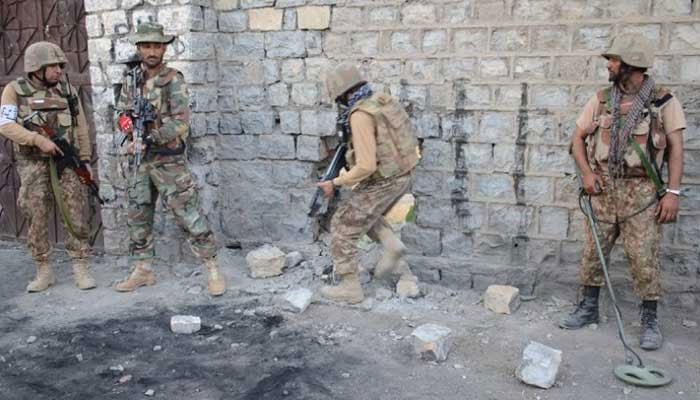Operation conducted in North Waziristan’s Datta Khel area.
Security forces engage terrorists belonging to Indian proxy.
Sanitisation operations underway to eliminate any other terrorist.
RAWALPINDI: As part of ongoing anti-terror efforts, security forces have neutralised 14 terrorists in an intelligence-based operation (IBO) in Khyber Pakhtunkhwa’s North Waziristan, the Inter-Services Public Relations (ISPR) said on Wednesday.
As per the military’s media wing, an operation was conducted in the general area Datta Khel of North Waziristan district upon the reported presence of terrorists belonging to Indian proxy “Fitna al Khwarij”, wherein the security forces effectively engaged the militants and gunned down 14 of them after an intense exchange of fire.
“Sanitisation operations are being conducted to eliminate any other Indian-sponsored terrorist found in the area,” the statement added.
Commending the security forces on successful operation, Prime Minister Shehbaz Sharif said that the nefarious intentions of terrorists, and enemies of humanity will be crushed.
We will uproot terrorism courtesy of the professionalism of the security forces, the PM remarked, adding that the government and security forces were determined to completely eradicate terrorism from the country.
The operation comes a day after five Indian-sponsored terrorists were gunned down during an IBO in the Kachhi district of Balochistan’s Mach area.
The IBOs are part of an ongoing national effort to curb the menace of terrorism which has witnessed a slight uptick in militant attacks in May 2025.
Data released by the Islamabad-based Pakistan Institute for Conflict and Security Studies (PICSS) indicates a 5% increase in attacks compared to April, though the overall picture suggests militant groups largely remained contained despite the regional geopolitical climate.
According to the PICSS monthly security assessment, May recorded 85 militant attacks, a marginal rise from 81 in April.
These incidents resulted in 113 fatalities, including 52 security forces personnel, 46 civilians, 11 militants, and four members of peace committees. The month also saw 182 individuals injured, comprising 130 civilians, 47 security personnel, four militants, and one peace committee member.
While the overall number of attacks saw only a modest increase, a deeper dive into the figures reveals some concerning trends.
Deaths among security personnel surged by a significant 73%, underscoring the persistent threat faced by Pakistan’s armed forces.
Civilian injuries also witnessed a dramatic 145% increase, jumping from 53 in April to 130 in May, highlighting the growing impact of militant activities on the general populace. Conversely, injuries among security personnel decreased by 20%, falling from 59 to 47.
In operations initiated by security forces during the month, at least 59 militants were killed, while five security personnel lost their lives.
Additionally, seven security personnel and five militants sustained injuries. Security forces also arrested 52 suspected militants during various intelligence-based operations.
Combining militant attacks and security operations, the overall casualty toll for May stood at 172 including 57 security personnel, 65 militants, 46 civilians, and four peace committee members.
A total of 194 people were injured, comprising 130 civilians, 54 security personnel, nine militants, and one peace committee member. Militants also abducted at least 19 individuals during the month.
A striking aspect of the May security landscape was a 78% rise in the deaths of security personnel, contrasted with a 68% decline in militant deaths compared to April. Notably, May was the first month since October 2024 in which militant fatalities were recorded in double digits (65), a sharp drop from 203 in April.
Balochistan and KP remained the most affected provinces, accounting for 82 of the 85 attacks nationwide. Balochistan experienced the highest level of violence, with 35 militant attacks that left 51 people dead-including 30 civilians, 18 security personnel, and three militants-and 100 injured (94 civilians, five security personnel, one militant).
The government has blamed Indian-backed Fitna al-Hindustan terrorists for perpetrating a number of terror incidents in Balochistan on behest of India.
Particularly, following the Khuzdar attack on schoolchildren last month, the ties between the nuclear armed neighbouring countries further took a nosedive amid already tense relations.
A powerful explosion near Zero Point in Balochistan’s Khuzdar targeted a school bus, martyring five, including three students, on the spot and injuring dozens of others, drawing condemnations from across the country as well as the international community.
Interior Secretary Captain (retd) Khurram Muhammad Agha on May 23 said Pakistan’s response to the recent Fitna al-Hindustan attack in Khuzdar would be “decisive”, warning that the perpetrators would not succeed in their objectives.
The army has pledged to eliminate the menace Indian sponsored terrorism from the country and reaffirmed the nation’s unwavering resolve to bring the perpetrators militancy and their facilitators to justice.
Pakistan has time again raised the issued of India sponsoring and backing terrorist groups such as Tehreek-e-Taliban Pakistan (TTP) and Baloch Liberation Army (BLA) to carry out attacks inside Pakistan.
Ties between the two nuclear-armed neighbours plunged to the lowest levels following recent standoff over killing of 26 tourists in Pahalgam, Indian Illegally Occupied Jammu and Kashmir, that the New Delhi blamed on Islamabad.
Pakistan categorically rejected the allegation while offering a transparent probe int the incident, and drew the international community’s attention to Indian proxies involved in terrorism inside the country.

